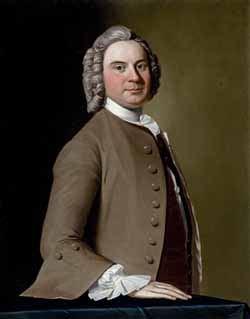Jerusalem Banned in Boston
I haven’t found any newspaper notices of the model of ancient Jerusalem in Boston the way it was advertised in Philadelphia, New York, Newport, and Providence (as quoted over the past two days).
But we know it was on display at the White Horse Tavern in the South End by 26 Oct 1764 because the merchant John Rowe (shown here) went to view it. And he was not impressed. In his diary he wrote:
Almost two weeks later, on 8 November, the Boston selectmen’s records contain this item:
The innkeeper at the White Horse Tavern was Joseph Morton, not Moulton—though this wasn’t the only time his name was misspelled that way. His teenage son Perez would grow up to be a noted and somewhat notorious attorney.
The “Mr. Adams” the selectmen sent to close this exhibit was Abijah Adams, a young men elected Clerk of the Market the previous month. He was chided the following January for “great neglect in the Warning Strangers to depart this Town.”
But let’s look at the selectmen’s own neglect. Even if Rowe had gone to see the model city on the day it opened, the exhibit had drawn “considerable sums from the Inhabitants” for fourteen days before the town fathers acted. This little Jerusalem had spent about three weeks in each of Newport and Providence. If the exhibitors had planned to spend about the same time in Boston, they were through most of their planned run when the selectmen ordered them “to leave this Town immediately.”
Perhaps, as I suspect happened in the case of rope-flyer John Childs, Boston’s selectmen were making a show of shooing something theatrical out of town only after people had had a chance to enjoy it if they chose.
Newspaper ads show that the Jerusalem model traveled back through New York, and on 6 June 1765 it was once again on display in Andrew Angel’s Green Tree Tavern in Philadelphia. “This Curiosity has been seen by a great Number of Gentlemen, Ladies, and others, with great Satisfaction,” the Pennsylvania Gazette advertisement assured readers. The price was one shilling, “but to the poorer Sort, and Children, an Allowance will be made.”
But we know it was on display at the White Horse Tavern in the South End by 26 Oct 1764 because the merchant John Rowe (shown here) went to view it. And he was not impressed. In his diary he wrote:
Went after dinner to see a Show at the White Horse wh. was a very faint Representation of the City of Jerusalem, in short ’tis a great Imposition on the Publick. I dont Remember to have seen so much Rainfall in so short a timeThe phrase “imposition on the public” was a common idiom for a fraud.
Almost two weeks later, on 8 November, the Boston selectmen’s records contain this item:
Complaint having been made to the Selectmen by a number of the Inhabitants, that ——— & his Mother are entertained at Mr. Moultons Tavern at the sign of the White Horse, at which Place he exhibits the City Jerusalem in Wood work whereby he draws considerable sums from the Inhabitants and as upon enquiry the Representation is not esteemed by Judges to be the work of Art & ingenuity, but rather an imposition on the public.Unfortunately, the selectmen didn’t record the name of the exhibitor and his mother, who were apparently traveling around with the model. Maybe town employee Robert Love wrote it down; he made regular stops at the White Horse Tavern asking about new arrivals from Providence, but people who were obviously passing through town may not have caught his attention.
Voted, that Mr. Adams be directed to warn them to leave this Town immediately, and also to acquaint Mr. Moulton that the Selectmen expects he will not suffer any more exhibitions of the same in his House.
The innkeeper at the White Horse Tavern was Joseph Morton, not Moulton—though this wasn’t the only time his name was misspelled that way. His teenage son Perez would grow up to be a noted and somewhat notorious attorney.
The “Mr. Adams” the selectmen sent to close this exhibit was Abijah Adams, a young men elected Clerk of the Market the previous month. He was chided the following January for “great neglect in the Warning Strangers to depart this Town.”
But let’s look at the selectmen’s own neglect. Even if Rowe had gone to see the model city on the day it opened, the exhibit had drawn “considerable sums from the Inhabitants” for fourteen days before the town fathers acted. This little Jerusalem had spent about three weeks in each of Newport and Providence. If the exhibitors had planned to spend about the same time in Boston, they were through most of their planned run when the selectmen ordered them “to leave this Town immediately.”
Perhaps, as I suspect happened in the case of rope-flyer John Childs, Boston’s selectmen were making a show of shooing something theatrical out of town only after people had had a chance to enjoy it if they chose.
Newspaper ads show that the Jerusalem model traveled back through New York, and on 6 June 1765 it was once again on display in Andrew Angel’s Green Tree Tavern in Philadelphia. “This Curiosity has been seen by a great Number of Gentlemen, Ladies, and others, with great Satisfaction,” the Pennsylvania Gazette advertisement assured readers. The price was one shilling, “but to the poorer Sort, and Children, an Allowance will be made.”


